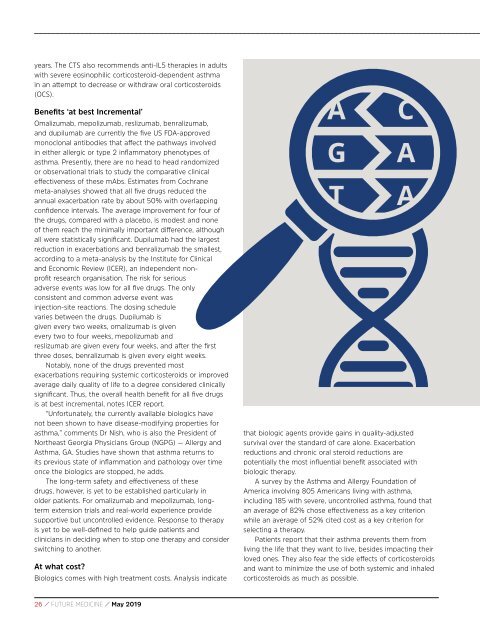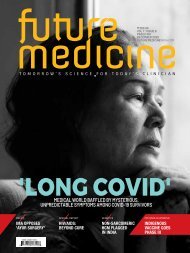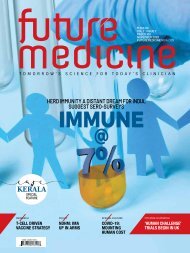may edition file
You also want an ePaper? Increase the reach of your titles
YUMPU automatically turns print PDFs into web optimized ePapers that Google loves.
years. The CTS also recommends anti-IL5 therapies in adults<br />
with severe eosinophilic corticosteroid-dependent asthma<br />
in an attempt to decrease or withdraw oral corticosteroids<br />
(OCS).<br />
Benefits ‘at best Incremental’<br />
Omalizumab, mepolizumab, reslizumab, benralizumab,<br />
and dupilumab are currently the five US FDA-approved<br />
monoclonal antibodies that affect the pathways involved<br />
in either allergic or type 2 inflammatory phenotypes of<br />
asthma. Presently, there are no head to head randomized<br />
or observational trials to study the comparative clinical<br />
effectiveness of these mAbs. Estimates from Cochrane<br />
meta-analyses showed that all five drugs reduced the<br />
annual exacerbation rate by about 50% with overlapping<br />
confidence intervals. The average improvement for four of<br />
the drugs, compared with a placebo, is modest and none<br />
of them reach the minimally important difference, although<br />
all were statistically significant. Dupilumab had the largest<br />
reduction in exacerbations and benralizumab the smallest,<br />
according to a meta-analysis by the Institute for Clinical<br />
and Economic Review (ICER), an independent nonprofit<br />
research organisation. The risk for serious<br />
adverse events was low for all five drugs. The only<br />
consistent and common adverse event was<br />
injection-site reactions. The dosing schedule<br />
varies between the drugs. Dupilumab is<br />
given every two weeks, omalizumab is given<br />
every two to four weeks, mepolizumab and<br />
reslizumab are given every four weeks, and after the first<br />
three doses, benralizumab is given every eight weeks.<br />
Notably, none of the drugs prevented most<br />
exacerbations requiring systemic corticosteroids or improved<br />
average daily quality of life to a degree considered clinically<br />
significant. Thus, the overall health benefit for all five drugs<br />
is at best incremental, notes ICER report.<br />
“Unfortunately, the currently available biologics have<br />
not been shown to have disease-modifying properties for<br />
asthma,” comments Dr Nish, who is also the President of<br />
Northeast Georgia Physicians Group (NGPG) — Allergy and<br />
Asthma, GA. Studies have shown that asthma returns to<br />
its previous state of inflammation and pathology over time<br />
once the biologics are stopped, he adds.<br />
The long-term safety and effectiveness of these<br />
drugs, however, is yet to be established particularly in<br />
older patients. For omalizumab and mepolizumab, longterm<br />
extension trials and real-world experience provide<br />
supportive but uncontrolled evidence. Response to therapy<br />
is yet to be well-defined to help guide patients and<br />
clinicians in deciding when to stop one therapy and consider<br />
switching to another.<br />
At what cost?<br />
Biologics comes with high treatment costs. Analysis indicate<br />
that biologic agents provide gains in quality-adjusted<br />
survival over the standard of care alone. Exacerbation<br />
reductions and chronic oral steroid reductions are<br />
potentially the most influential benefit associated with<br />
biologic therapy.<br />
A survey by the Asthma and Allergy Foundation of<br />
America involving 805 Americans living with asthma,<br />
including 185 with severe, uncontrolled asthma, found that<br />
an average of 82% chose effectiveness as a key criterion<br />
while an average of 52% cited cost as a key criterion for<br />
selecting a therapy.<br />
Patients report that their asthma prevents them from<br />
living the life that they want to live, besides impacting their<br />
loved ones. They also fear the side effects of corticosteroids<br />
and want to minimize the use of both systemic and inhaled<br />
corticosteroids as much as possible.<br />
26 / FUTURE MEDICINE / May 2019


















